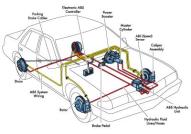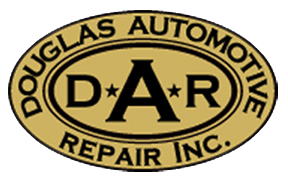How do they work? Basically, the power brake system helps you provide braking power so that you don’t have to do all the work with your brake pedal.
The brakes themselves are applied at the wheel using hydraulic pressure. When we step on the brake pedal, we create pressure in the power booster that’s multiplied by vacuum from the engine. The resulting pressure pushes brake fluid through the master cylinder into tubes and hoses that run to the brake at each wheel.

When there’s a problem, it’s usually a fluid leak somewhere along the line. It could be at a fitting or a hose, or even an internal leak in the master cylinder. A leak gives the pressurized fluid somewhere to go other than to the brakes, so stopping power is hurt. Lose enough fluid and you can’t stop at all. Of course that’s extremely dangerous.
If you notice any decrease in stopping power or if your pedal seems mushy, you could have a problem. There are some preventive maintenance items for the power brake system that will help them last longer.
Obviously you’d want to make sure your brake fluid is filled to the recommended level. Low fluid in the master cylinder could indicate a leak or worn brake material. Master cylinder leaks are usually due to it wearing out, but leaks in the brake lines and connectors can be minimized by replacing the brake fluid from time to time. Additives in brake fluid protect against corrosion that can damage brake components.
Brake fluid also attracts moisture which can lead to rust — not a good thing for expensive anti-lock brake components. Also, significant amounts of water in the brake fluid can affect stopping power because the water has a much lower boiling point than brake fluid. In the high temperature environment of the brake system, the water can vaporize, and steam doesn’t do a very good job of providing hydraulic pressure.
A final word — make sure you use the recommended type of brake fluid. There are several kinds, and using the wrong one can lead to total brake failure.
Douglas Automotive Repair, Inc. can help you. Just give us a call at 630.904.6300 with your brake questions or to schedule an inspection.This entry was posted in Brakes, Preventive Maintenance and tagged Brake Fluid, Brakes, Preventive Maintenance on October 24, 2017.
